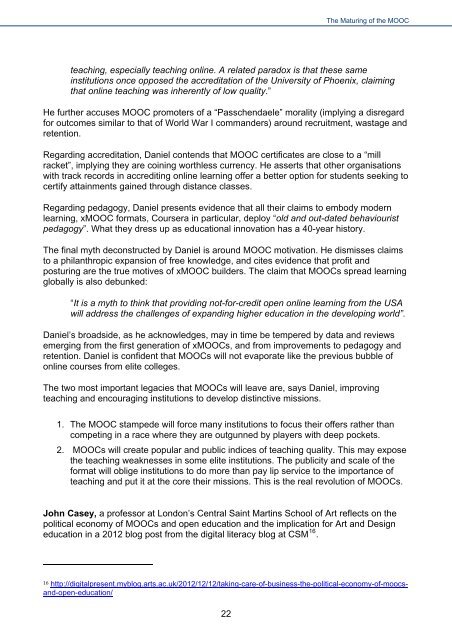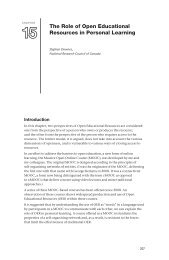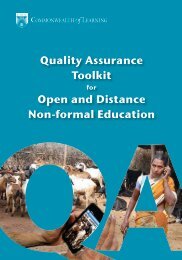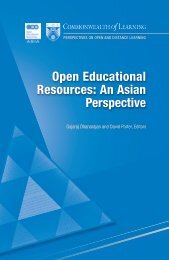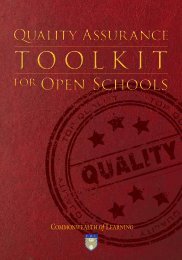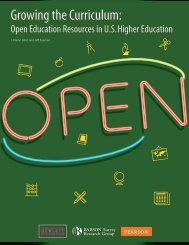The Maturing of the MOOC
The maturing of the MOOC: literature review of massive ... - Gov.uk
The maturing of the MOOC: literature review of massive ... - Gov.uk
- No tags were found...
Create successful ePaper yourself
Turn your PDF publications into a flip-book with our unique Google optimized e-Paper software.
<strong>The</strong> <strong>Maturing</strong> <strong>of</strong> <strong>the</strong> <strong>MOOC</strong><br />
teaching, especially teaching online. A related paradox is that <strong>the</strong>se same<br />
institutions once opposed <strong>the</strong> accreditation <strong>of</strong> <strong>the</strong> University <strong>of</strong> Phoenix, claiming<br />
that online teaching was inherently <strong>of</strong> low quality.”<br />
He fur<strong>the</strong>r accuses <strong>MOOC</strong> promoters <strong>of</strong> a “Passchendaele” morality (implying a disregard<br />
for outcomes similar to that <strong>of</strong> World War I commanders) around recruitment, wastage and<br />
retention.<br />
Regarding accreditation, Daniel contends that <strong>MOOC</strong> certificates are close to a “mill<br />
racket”, implying <strong>the</strong>y are coining worthless currency. He asserts that o<strong>the</strong>r organisations<br />
with track records in accrediting online learning <strong>of</strong>fer a better option for students seeking to<br />
certify attainments gained through distance classes.<br />
Regarding pedagogy, Daniel presents evidence that all <strong>the</strong>ir claims to embody modern<br />
learning, x<strong>MOOC</strong> formats, Coursera in particular, deploy “old and out-dated behaviourist<br />
pedagogy”. What <strong>the</strong>y dress up as educational innovation has a 40-year history.<br />
<strong>The</strong> final myth deconstructed by Daniel is around <strong>MOOC</strong> motivation. He dismisses claims<br />
to a philanthropic expansion <strong>of</strong> free knowledge, and cites evidence that pr<strong>of</strong>it and<br />
posturing are <strong>the</strong> true motives <strong>of</strong> x<strong>MOOC</strong> builders. <strong>The</strong> claim that <strong>MOOC</strong>s spread learning<br />
globally is also debunked:<br />
“It is a myth to think that providing not-for-credit open online learning from <strong>the</strong> USA<br />
will address <strong>the</strong> challenges <strong>of</strong> expanding higher education in <strong>the</strong> developing world”.<br />
Daniel’s broadside, as he acknowledges, may in time be tempered by data and reviews<br />
emerging from <strong>the</strong> first generation <strong>of</strong> x<strong>MOOC</strong>s, and from improvements to pedagogy and<br />
retention. Daniel is confident that <strong>MOOC</strong>s will not evaporate like <strong>the</strong> previous bubble <strong>of</strong><br />
online courses from elite colleges.<br />
<strong>The</strong> two most important legacies that <strong>MOOC</strong>s will leave are, says Daniel, improving<br />
teaching and encouraging institutions to develop distinctive missions.<br />
1. <strong>The</strong> <strong>MOOC</strong> stampede will force many institutions to focus <strong>the</strong>ir <strong>of</strong>fers ra<strong>the</strong>r than<br />
competing in a race where <strong>the</strong>y are outgunned by players with deep pockets.<br />
2. <strong>MOOC</strong>s will create popular and public indices <strong>of</strong> teaching quality. This may expose<br />
<strong>the</strong> teaching weaknesses in some elite institutions. <strong>The</strong> publicity and scale <strong>of</strong> <strong>the</strong><br />
format will oblige institutions to do more than pay lip service to <strong>the</strong> importance <strong>of</strong><br />
teaching and put it at <strong>the</strong> core <strong>the</strong>ir missions. This is <strong>the</strong> real revolution <strong>of</strong> <strong>MOOC</strong>s.<br />
John Casey, a pr<strong>of</strong>essor at London’s Central Saint Martins School <strong>of</strong> Art reflects on <strong>the</strong><br />
political economy <strong>of</strong> <strong>MOOC</strong>s and open education and <strong>the</strong> implication for Art and Design<br />
education in a 2012 blog post from <strong>the</strong> digital literacy blog at CSM 16 .<br />
16 http://digitalpresent.myblog.arts.ac.uk/2012/12/12/taking-care-<strong>of</strong>-business-<strong>the</strong>-political-economy-<strong>of</strong>-moocsand-open-education/<br />
22


